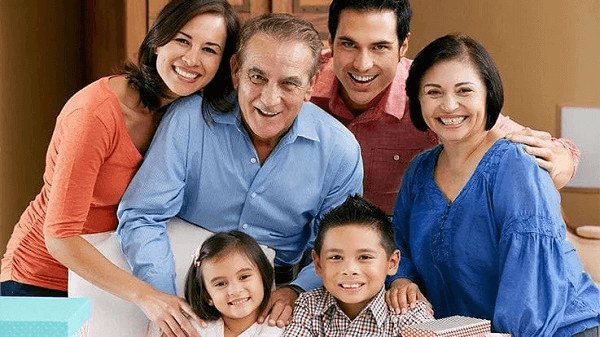Family Definition"Family" is one of the words in the English language that has the most unclear definitions since it may mean different things to different individuals. Another person could regard the family as comprising both near and distant relatives, while one would define family as the people they live with at home. 
Others, however, view their immediate family or their pets as family. Families come in many shapes and sizes but share the same fundamental values of love and commitment. Definition of Family
There are multiple definitions of family in the dictionary. A basic social group is "composed of one or more parents and their offspring" in one description. Although this definition is a fine place to start, it only includes a few contemporary family configurations, such as childless couples, friends who are family, or many more variants of the family unit. "Two or more persons who share aims and beliefs, have long-term commitments to one another, and frequently reside in the same house" is a different description. The word "family" has various definitions today, all of which are good and worthy of celebration. Who Creates Families?
Father, mother, and kids make up the conventional family. The nuclear family is frequently shown as the ideal family on television. However, the twenty-first century exhibits a variety of family groups, some extremely unlike the typical unit of earlier decades. Some families decide against having kids or are unable to have kids for emotional or physiological reasons. A family typically consists of parents and children, but a more comprehensive definition is required to recognize alternative family arrangements properly. In addition to the conventional definition of family, many individuals also view a group of friends and pets as family members. It is up to the family members to decide who makes up the family. Blood relations may stay in a person's life at their choice or may be removed if they harm their well-being. When selecting who fits their unique sense of family, many prefer to include kind and helpful people in their extended family. Families With a Single Parent
Children living in American families in 2020 made up 25% of the total population. It was common for two dedicated parents to raise their children while they lived together, but that is no longer the case. Since the 1960s, single-parent homes have increased by three times, and 19 million youngsters identify their family as one with just one parent. Millions of parents take care of their children every day without the support of a spouse or partner, despite the added financial and emotional stress that being a single parent may bring. Extended Families
Families today sometimes go well beyond just parents and siblings. The term "extended family" refers to a person's genetically connected relatives. An individual's extended family may consist of in-laws, grandparents, cousins, aunts, and uncles. Extended families sometimes reside under one roof with family units, particularly in various cultures worldwide. Even if extended families may reside in different locations, they can still be connected by a shared history, heritage, and traditions and by a shared devotion to one another. Combined Families
A combined family, also known as a stepfamily, is created in a marriage where both married partners have children from previous relationships. They establish a new family dynamic by combining their lives. Today, blended families are extremely popular, and 40% of married couples in the US are step-couples. Living in a combined family has its share of challenges, such as adjustment times, resentment, misunderstandings, and jealousy, but it also has its share of advantages. In homes with many contributing parents, stepchildren can develop into close friends, participate in new family events, and get financial and emotional support. A Group of Close Friends
Some people view their friends as being equally or even more important than their family members. People who have lost or become away from their close family may form a family group of friends who share their goals and interests to enhance or replace the missing family life. Even though it is unorthodox, this family may be just as close as, if not even closer than, a traditional one. Blood relations cannot be chosen, but friends may be chosen! You can exclusively attract uplifting and encouraging individuals because you can choose whom you want to include in your friends-as-family group. In addition, some people with loving families have a wide network of friends whom they view as extensions of their natural or legal family or as a second family. They have it all and offer a shining example of the idea that the kind and encouraging people you spend time with enrich your life. Family with Pets:
In an extended family, pets can play an important role. Animals give unconditional affection and support while introducing a responsibility component to a family, especially for young children. For couples who are unable to have children, pets may be a wonderful substitute for kids. Many people consider their pets, such as dogs and cats, to be extra family members, and they grieve greatly when they pass away. Defining Family Newly
Each person should try to define a family according to their standards rather than simply using the dictionary definition. In your lifetime, you can have several families, even several families, at once if you so desire. Whether you define your family traditionally or unconventionally, it should be the family structure that serves your needs. Family, as they say, is what you make of it. Your family may provide the assistance you require to flourish, whether it consists of blood relatives, friends, animals, or a combination of these.
Next TopicFat Definition
|
 For Videos Join Our Youtube Channel: Join Now
For Videos Join Our Youtube Channel: Join Now
Feedback
- Send your Feedback to [email protected]
Help Others, Please Share










